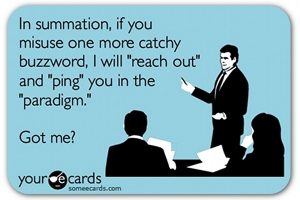The buzzing buzzwords….
 The word innovation is the mantra of business world and business leaders. Full marks are given to innovation and novelty. As far as buzzwords are concerned they are not used as novelty or as compliment but in reality they are used to express sarcasm. Do you know the king buzzword “innovation” wasn’t a compliment, it was used as a satire, it was an accusation? In fact, shouts of “Innovator” used to be similar to charges of dissent. As with any question of intellectual history, the path of innovation through the centuries looks very complicated.
The word innovation is the mantra of business world and business leaders. Full marks are given to innovation and novelty. As far as buzzwords are concerned they are not used as novelty or as compliment but in reality they are used to express sarcasm. Do you know the king buzzword “innovation” wasn’t a compliment, it was used as a satire, it was an accusation? In fact, shouts of “Innovator” used to be similar to charges of dissent. As with any question of intellectual history, the path of innovation through the centuries looks very complicated.
Canadian historian Benoit Godin has done extensive research on the topic. According to his work, innovation, or the new, does not exist as such. It is created through the eyes and through discourse. The Wikipedia describes that a business could not operate without buzzwords; they are shorthand or internal shortcuts and they make perfect sense to the people in that company. However, a useful buzzword can become co-opted into general popular speech and lose its usefulness. According to management professor Robert Kreitner, “Buzzwords are the literary equivalent of Gresham’s Law. They will drive out good ideas.”
 Further Godin explains that innovation as is meant today started catching its roots as a term associated with science and industry in the nineteenth century, as Industrial Revolution began. The business verbatim in that era focused more strongly on invention, particularly technical inventions. Several factors helped invention develop an esteemed and positive connotation, including the rise of consumer culture, increased numbers of patents, and strong government focus on building labs for research and development.
Further Godin explains that innovation as is meant today started catching its roots as a term associated with science and industry in the nineteenth century, as Industrial Revolution began. The business verbatim in that era focused more strongly on invention, particularly technical inventions. Several factors helped invention develop an esteemed and positive connotation, including the rise of consumer culture, increased numbers of patents, and strong government focus on building labs for research and development.
A buzzword sums up a concept or an idea which otherwise needs to be explained in several sentences. It is a word or phrase, often an item of jargon that is fashionable at a particular time or in a particular context. Some of the latest buzzwords are “big data”, “millennial” (children born between 1982-2004), “IoT” means Internet of things, “localisation” which describes localised wants of consumers, “News Jacketing” which means media coverage including social media engagement.
Over last few decades, different industries have developed their own buzzwords. Some of today’s most popular buzzwords were created by academicians. Some were coined by consultants who sold the idea that happy workers are effective workers. The Wall Street lingo of the 1980s all comes back to “the bottom line,” while the techie terms of today suggest that humans are creative computers, whose work is measured in “capacity” and “bandwidth.” Corporate jargon may seem meaningless some times; especially the word “bullshit” actually reveals a lot about how workers think about their lives.
 Environment has, however, become a buzzword, and behind all the hoopla that such an honour brings are pockets of concern and damage control.
Environment has, however, become a buzzword, and behind all the hoopla that such an honour brings are pockets of concern and damage control.
You will hear people using buzzwords in every nook and corner. The formal style of discussion is now drowning into buzzwords. They are used in business meetings, seminars, workshops, presentation very naturally; ‘big data’, ‘programmatic’, ‘real-time’, ‘earned/owned’, ‘discovery marketing’ are making rounds in all sorts of discussions. Some people are using it as hype, a style, so life is changing, lingo is changing, expressions are changing and buzzwords are also changing. They live a short lifespan. What starts off with a definition often gets fuzzy. People end up using the buzzword as a placeholder or a box they need to check, but don’t know what it means. Yes, many people use buzzwords in wrong contexts.
People string these buzzwords together into sentences and hope they mean something; the fact that this often goes uncontested. The science of language is no more challenged. People have resigned from using the right texture of language, they wilfully remain ignorant.
It’s as if people feel relaxed by using buzzwords in the complex digital marketing arena. This buzz quote by Elizabeth McGovern sums up how buzzwords have taken over the spoken and written language in world “I miss sometimes the buzz of America. A sense that anything can change at the drop of a hat. In a way, it’s an exhausting thing to live with.” This simply means with every New Year comes new batch of buzzwords which we need to keep up with.













































